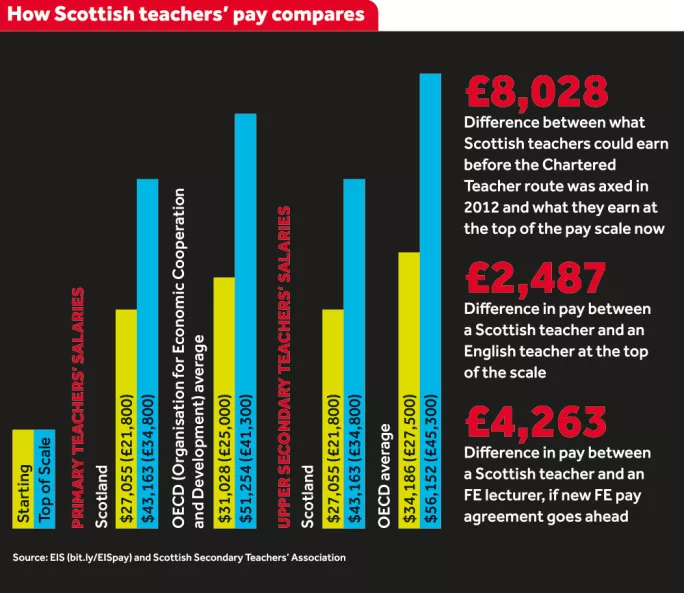Salary dispute nearing ‘critical point’ - unions

Strike action by teachers is a growing possibility as members of Scotland’s largest education union gather for their annual general meeting in Perth this week.
Speaking to Tes Scotland before the three-day meeting started yesterday, Larry Flanagan, general secretary of the EIS teaching union, said that pay would be a “key issue”, 17 years since the last major review of teachers’ salaries. The situation had reached a “critical point” and the mood of teachers was “rapidly” hardening, he added.
Mr Flanagan said: “We’re going to struggle to recruit teachers simply because it’s not seen as a high-end job...teaching is not seen as being as attractive a proposition as it might have done previously.” Salary was one reason, but prospective teachers might also be put off by “excessive workload and poor work-life balance”, he added.
“Significantly, motions to AGM have set out a clear timetable for moving towards industrial action if pay talks stagnate. With inflation rising again, the mood of teachers is certainly hardening on the issue of pay.” This year, there are three motions on salaries that raise the prospect of strike action, compared with only one at the 2016 EIS AGM.
Mr Flanagan said, however, that there is still time to avoid “letting a full crisis develop, as it has in England”. A dispute involving secondary teachers in West Dunbartonshire last year marked the first time Scottish teachers had been on strike since the 1980s, aside from joint action with other public-sector unions over pensions in 2011. But Mr Flanagan said that a tipping point was being reached as, in the past decade, salaries had failed to keep pace alongside inflation and changes to National Insurance and pension contributions.
He added that pay was not the only issue, with concerns surrounding career progression as the number of promoted posts was shrinking and the Chartered Teacher route was scrapped in 2012.
Mr Flanagan said: “Disgracefully, Scottish teachers are still waiting for [local authorities’ body] Cosla to put together a negotiating team for a pay settlement that was due to be paid last April. That is unacceptable.”

In her speech yesterday, outgoing EIS president Margaret Smith was due to say that a 1968 survey of salary positions in the UK showed that, for the past 50 years, teachers had achieved a smaller increase in their standard of living than most other workers. However, she was expected to add that the salary offer that year was for 5.5 per cent over two years. Today’s teachers in Scotland have had a 2.5 per cent increase over the past two years.
A spokesman for Cosla - which, along with education unions and the Scottish government, forms the tripartite Scottish Negotiating Committee for Teachers (SNCT) - said: “The [May] local government elections have delayed our re-engagement in pay talks with the teachers’ trade unions, but this should be rectified fairly soon. We did, in fact, propose to the EIS and others in March, in our opening discussions, that they should now accept the 1 per cent uplift in pay on offer to all local government workers and we could deal with the other aspects of their claim later, but they declined that opportunity.”
He said this would have allowed the teachers’ pay increase to be implemented by April, and added: “We will arrange to meet with the teachers’ trade unions as soon as the elected members who will lead the negotiations are appointed to the SNCT Bargaining Group”.
A government spokesman said: “Teachers’ pay and conditions of service are matters for the SNCT. The SNCT negotiations are currently ongoing and the Scottish government will play our part in that process.”
Other issues set to dominate the EIS AGM include comprehensive education, poverty, staff numbers, class sizes, additional support needs and work-life balance. There will be a call for a survey to explore how “demonisation of Muslims in society” may affect teachers.
You need a Tes subscription to read this article
Subscribe now to read this article and get other subscriber-only content:
- Unlimited access to all Tes magazine content
- Exclusive subscriber-only stories
- Award-winning email newsletters
Already a subscriber? Log in
You need a subscription to read this article
Subscribe now to read this article and get other subscriber-only content, including:
- Unlimited access to all Tes magazine content
- Exclusive subscriber-only stories
- Award-winning email newsletters